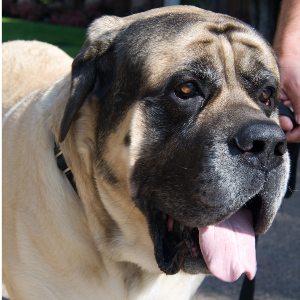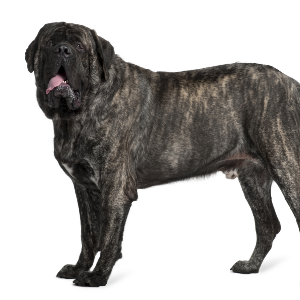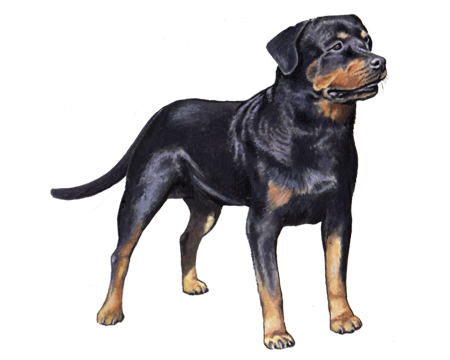
Mastiff
Mastiffs are courageous, dignified, and good-natured companions that are extremely loyal to their family members. These large, protective dogs make calm and well-mannered house pets.
Interested in discovering if your dog is a Mastiff?
Check out Wisdom Panel's DNA tests.

Mastiff Traits
General Appearance
Huge dogs, Mastiffs weigh between 175 and 200 pounds on average.
Coat and Colouring
Mastiffs have short, dense double coats of fawn, apricot, or brindle with stripes.
Distinctive Physical Traits
The rectangular-shaped body of the Mastiff is heavily muscled, and the head is prominent and massive. Trademarks of this breed include a wrinkled forehead, drooping jowls, a black mask around the eyes and nose, ears that flop downward, and a tail that sits high on the rear end.
Mastiff Temperament
Mastiffs may be enormous, powerful, and impressive, but they are actually gentle giants in the dog world. They have calm, patient, and affectionate personalities, are relatively quiet, and demonstrate excellent skills as guards and watchdogs. Mastiffs can be very protective of family and territory. They may be suspicious of strangers who visit the home, but they don’t bark much.
This breed is generally good with children. That being said, all dogs require supervision when children are around. Mastiffs are eager to please and love attention and companionship.


Mastiff History
An ancestor to many modern purebred dogs, the Mastiff has been around since 2500 BC. Caesar praised the Mastiff for its fighting ability in 55 AD, and Phoenician sailors introduced the breed to England in the 6th century.
The breed participated in blood sports, such as bear-baiting, bull-baiting, lion-baiting, and dogfighting. Mastiffs also served in war. Legend has it that at the Battle of Agincourt in 1415, a Mastiff defended his wounded master, Sir Peers Legh, for many hours until he was rescued. This is just one example of what Mastiffs are known for: protecting their masters and property.
The Mastiff likely made its way to America aboard the Mayflower. But few Mastiffs were imported to the United States until the late 1800s. And after Britain passed laws in 1835 that banned baiting sports, the breed fell in popularity and began to disappear. After World War II, the Mastiff faced extinction. Fortunately, proponents of Mastiffs imported them and eventually re-established the breed.
Mastiff Care
Nutrition
Mastiffs grow quickly. Good nutrition—especially during the first two years of life—will support healthy development. Calcium and phosphorus ratios are particularly important in preventing skeletal disorders, which are common in this breed.
Free-feeding your Mastiff is not ideal, as it can lead to excessive eating and weight gain. So, scheduled meals tend to be the recommended approach.
Grooming
Mastiffs are easy to groom due to their short, dense coat. A quick brushing every few days is usually sufficient. Extreme shedding occurs once or twice a year. At such times, more frequent grooming with a strong, toothed comb can help remove dead hair.
Deep wrinkles surround the Mastiff’s head, eyes, and muzzle. You should check and clean these (and the ears) regularly. Likewise, keep your dog’s nails short to prevent discomfort and mobility problems.
Finally, Mastiffs are the drooling type. So, you might want to have a spare cloth handy at all times for wiping.
Exercise
Mastiffs have relatively low exercise needs, and they can be quite the couch potato. But regular exercise is best for their health and happiness. Dog sports such as agility, carting, rally and competitive obedience, weight pull, and tracking are all great options for keeping your Mastiff active.
Training
Mastiffs are quite food-motivated and respond well to reward-based training techniques. Conversely, loud commands and forceful measures tend to activate the Mastiff’s stubborn tendencies.
Early socialization with people and other pets is also critical for helping your Mastiff grow into a well-rounded, friendly companion.

Mastiff Genetic Health Conditions
-
Canine Multifocal Retinopathy 1
Canine Multifocal Retinopathy 1 (CMR1) is an eye disorder that can cause retinal decay which may impact vision, but very rarely results in blindness.
-
Dominant Progressive Retinal Atrophy
Dominant Progressive Retinal Atrophy (DPRA) is an eye disease resulting in vision loss and eventual blindness.
Knowing if your Mastiff is a carrier or at-risk for these conditions can help you and your veterinarian plan for your pup's lifelong care. With Wisdom Panel™ Premium, you can get results for over 200 genetic health tests.
Breed Group
Guard
Dogs of the Guard Group were bred to guard people and property. They are often quick to learn and these intelligent, capable animals make solid companions.























